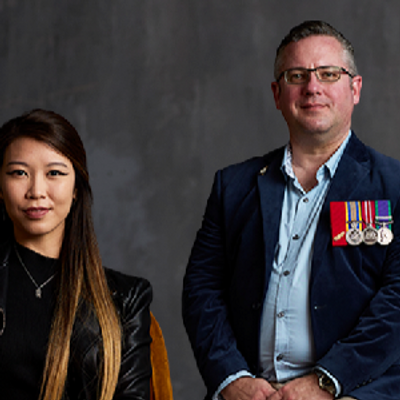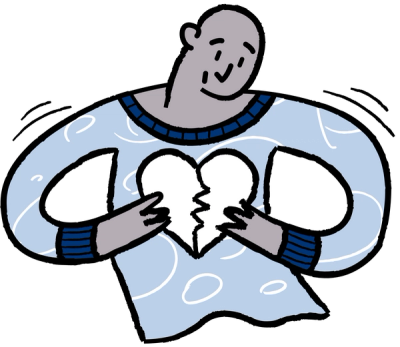Correcting our understanding of suicide and how to prevent it
Suicide is a topic we don’t talk about much as a society, and comes with a history that has left us with a number of myths, stigmas and misconceptions that are still common, but simply aren’t true.
We believe it’s important to address these myths, stigmas and misconceptions because they can prevent people from getting the help they need.
When people believe myths like "suicide is a selfish act" or "only weak people attempt suicide," they may feel ashamed or judged for their thoughts or behaviours, which can stop them from reaching out for help. This can be especially dangerous because suicide is a serious issue and people who are struggling need to be able to access support without fear of judgement or stigma.
Addressing these myths and stigmas can also help to increase empathy, understanding and awareness of suicide, and those struggling with suicidal thoughts. We all have a role to play in creating a society where people feel comfortable seeking help and support during their darkest moments. This will ultimately help to save lives.
“In my home, there was such a stigma against suicide and mental health, particularly because my parents came from different countries. They didn't even have a word for suicide or mental health, and they couldn't understand what it was.”
Below are some of the most common stigmas, myths, and misconceptions about suicide.
Myths about the nature of suicide
- 'People will always find a way to kill themselves if they want to'
Research has consistently shown that restricting access to methods used in suicide can lead to a significant decrease in suicide rates - that people won’t ‘just find another way’.
In the 1960s, the United Kingdom experienced a rise in the number of suicides by domestic gas poisoning, as the type of gas used in homes contained high levels of carbon monoxide at the time. Over the course of a few years, the country changed the type of gas used in homes to a less-toxic gas, which reduced the number of suicide deaths by gas poisoning by 70%. The use of other methods of suicide did not increase as a result.
This is because people’s desire to end their lives is often a momentary urge, and simply removing the ability for someone to take action on that urge in the moment, can give them the time and space for that urge to subside, and for them to access the help they need.
- 'Suicide cannot be prevented'
- 'Most suicides happen suddenly without warning'
Myths about talking about suicide
- 'Asking someone if they are suicidal will make them more likely to attempt suicide'
Asking someone if they are suicidal, in a compassionate and non-judgemental way, can actually help them to feel heard and supported. Research has shown that asking about suicide can reduce risk by providing an opportunity for the person to express their feelings and connect with support and resources. Talking about suicide will not ‘put the idea in their heads’ or make it more likely for someone to take their own lives.
- 'If you don’t know how to bring it up with someone, you shouldn’t say anything'
If you think someone might be at risk of suicide, or if you’d like to feel more prepared for the conversation should it come up, we’ve got tips on how to talk to someone about thoughts of suicide here.
Myths about who is at risk of suicide
- 'Only people with a diagnosed mental illness are suicidal'
Many people often think of suicide as the consequence of serious mental health issues, or that people who die by suicide must have been struggling with their mental health. However, while mental illness can be a significant risk factor for suicide, many people who experience suicidal thoughts or behaviours do not have a mental illness.
In fact, 50-60% of people who die by suicide were not being treated for mental health issues at the time of their death.
Aside from mental illness, there are many other factors that can also play a role in suicidality, such as stressful life events, trauma, relationship problems, financial difficulties, substance misuse, and risky decision making, among others. It's important to recognise that the causes of suicide are complex, and suicidal thoughts can affect anyone, at any time.
- 'Only adults are at risk for suicide'
- 'Only certain types of people are at risk for suicide'
“I was told I wasn't poor enough, ugly enough or dumb enough to be suicidal. It was like I had to meet a criteria to appear like someone who was suicidal. ”
Myths about people who feel suicidal
- 'People who die by suicide are ‘selfish’'
Suicide is not a decision made out of selfishness or a desire to hurt others. Rather, individuals who die by suicide are often struggling with intense emotional pain, feelings of hopelessness, and a sense of being a burden to their loved ones. They often, wrongly, see suicide as the only way to escape the pain they feel or situation they’re in.
''My thoughts of suicide have always been about protecting others, removing potential risks, removing potential harm to others, or making their lives better.''
- 'People who attempt or die by suicide are ‘weak’'
- 'Those who talk about suicide are ‘attention seeking’'
- 'People who attempt suicide are seeking revenge and trying to get back at someone'
- 'If someone is suicidal now, they will always be suicidal'
Download our fact sheets:






